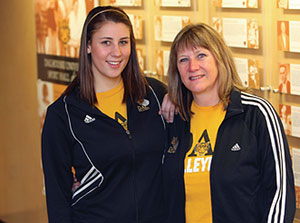 |
| Dal Tiger Louise Facca and her mother Lorraine. (Nick Pearce Photo) |
In 1982, the Dalhousie Tigers did something no other Atlantic Canadian university has ever done: win the CIAU (now CIS) women's volleyball national championship.
That team, one of only seven to win Dalhousie a national title in team sports, has been enshrined in both the Dalhousie Sports Hall of Fame and Nova Scotia Sports Hall of Fame. Lorraine Facca played on that team and fondly clinching the victory, an upset against top-ranked Calgary. It’s a sweet memory she has shared with her daughter Louise.
With both her mother and father playing for the Tigers—father Adrian was a member of the men’s hockey team—it was perhaps inevitable that Louise would one day wear a black-and-gold jersey as well.
From Aurora, Ont., Louise made her first visit to Dal when her mom’s '82 team held a reunion game at Dalplex in 2002 to coincide with its induction into the Nova Scotia Hall of Fame. Louise served as a ball girl for that game and even managed to score a few.
During her first season with the Tigers, Louise made a strong impression. In 12 league matches, she led the team in kills with 2.80 per game.
Being part of a rebuilding Tigers team is an experience far different from her mother's time at Dal, when the women's volleyball program was a national contender. But that hasn't dampened Louise's enthusiasm. In fact, the experience of playing (and losing) in the AUS championship tournament has only re-energized her going into the off-season. "Losing like that is a feeling you don't ever want to experience again, but I think that playing that playoff game will help us next year for sure."
For her part, Lorraine is happy to see Louise succeeding on the court. The elder Facca still plays competitively in Ontario, as well as giving back to the sport as a coach. She has seen the game evolve in the past 20 odd years, and for the better, she says, pointing to some rule changes that have lead to the game becoming more accessible to all types of players. “The libero (a defensive specialist position) being introduced allowed big girls who weren’t so mobile defensively to be able to play, as well as smaller quicker athletes who can play the libero position.”
She also points to the rally point system of scoring as an improvement, postulating that it has made the game more exciting to watch and quicker to play. "When we played you could only score a point when you held serve, so matches would go three hours.” Other rule changes, such as no longer allowing officials to call double hits on first contact and lightening up on net violations, have also improved the game, she says.
